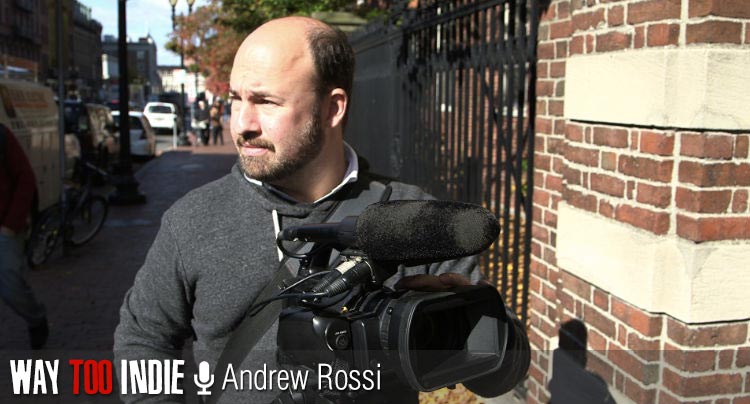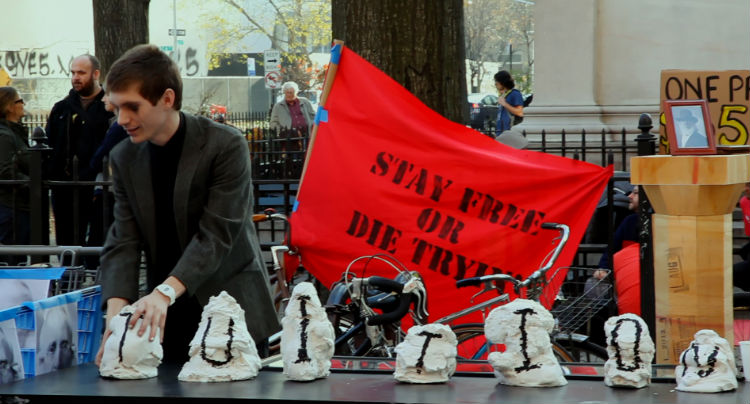Andrew Rossi On ‘Ivory Tower’, the Future of Higher Education

In Ivory Tower, director Andrew Rossi investigates the soaring costs of tuition and other problematic changes in the American higher education system. Students have been increasingly drowned in student loan debt over the past few decades, and with some of the country’s most respected institutions shifting their budgets to pay for egregiously expensive HD TVs, swimming pools, rock climbing walls, and other luxuries to attract prospective students, the value of the education students receive doesn’t seem to be worth the exorbitant cost of access.
Alternate routes have opened up for youths graduating high school, including the Thiel Fellowship, which gives youths a $100,000 grant to skip college and start their own business, and Deep Springs, a tuition-free, all male desert school in which students govern themselves and spend half of their days doing farm work. Rossi explores these alternatives as well as interviewing influential figures and students in the Ivy League, painting a comprehensive picture of the alarming state of higher education today.
We spoke to Rossi about the fear of rising tuition costs, the extensive research process, where the problem of high tuition started, how young people have reacted to the film, if online courses are the future of higher education, and more.

What set you on the path to making Ivory Tower?
Andrew: I’ve always been drawn to stories about disruption and change in institutional settings or sectors of society or culture. The last film I did was about the New York Times, looking at the crisis of the newspaper industry. When I finished that film, it was 2011, when student loan debt had just exceeded a trillion dollars. It was when Peter Thiel, the founder of PayPal, had offered people to drop out of school. It was also when certain classes that were being designed for online delivery were starting to gain some traction. There were a lot of different factors that were causing people to rethink higher education. That really appealed to me as a moment to go on the ground with cameras at campuses around the country and tell the stories of different students and faculty who could give life to what’s happening in higher education.
The state of student debt and high tuition rates frightens me as a future parent. Does it frighten you as well?
Andrew: It does. When my kids, who are 6 and 4, are in college, it’ll cost about $500,000-$550,000 for four years of school. That’s an incredible amount of money to think of. I personally feel that, if my children wanted to pursue a course other than going to traditional college, I’d definitely be open to helping them do that. One of the things we see in the film is that going to college still provides a wage premium. Those that go to college and get a degree make about a million dollars more over the course of their life than those who only have a high school diploma. Certainly we don’t want to forget that, in the ideal case, college is an engine of social mobility. However, I think the stigma associated with not going to college should go away. There are other programs that don’t fit into that four year model.
When did the paradigm shift happen that led to college tuition being higher than ever?
Andrew: We see the increase in tuition beginning in 1978. Since then, tuition has risen by 1120%. What we see as one of the key drivers is reduction in state funding, which has caused this increase. If you try and understand why states have started to provide less funds for colleges, it can be traced to a movement in the ’70s in which conservative governors, like Ronald Reagan, began to argue that higher education should be viewed as a private good and not a public good. As we see in the film, there’s a long tradition in this country of government supporting higher education, like the creation of the land-grant universities in the 1860s under the Morrill act, the G.I. Bill, and Lyndon Johnson’s higher education act in 1965. In all these cases, the government seems to be operating on the idea that it’s a basic human right to be able to pursue education, and that that should include higher education. In the 1970s, you have a real shift in this philosophy that’s driven by conservatives, in large part, to view college as an opportunity for an individual to make more money, but not necessarily to benefit the common wheel. That’s when it starts.
I imagine making of the film took a mountain of research.
Andrew: Absolutely. We tried to corral some of the leading studies that are driving the conversation in higher education. We looked at Academically Adrift by Richard Arum and Josipa Roksa, Paying for the Party by Elizabeth Armstrong and Laura Hamilton. Andrew Delbanco, who is a professor of humanities at Columbia University, has written a book called College: What it Was, Is, and Should Be. He’s the moral conscience of the film. Those are some of the leading voices of the film, and we feel they’ve provided some remarkable analysis on student loan debt, the historical origins of college, and the analysis of what’s really happening on campus.
There’s a ton of useful information in the film. One of the challenges for any documentarian who tackles an info-rich subject like this is to craft a compelling story without making the film feel like medicine. Does this kind of storytelling come naturally to you, or was it a struggle?
Andrew: It was definitely a challenge. We felt we had an obligation to provide context and evidence for some of the arguments that are contained in the film. It takes a lot of movie to do that. But, as you say, we also had to provide a character-driven narrative for the viewer to have a journey in addition to understanding an argument that’s more along the lines of an essay. I think the film is sort of a hybrid of an essay film and a character-driven narrative. We also follow the stories of the Cooper Union students in their trajectory of trying to protest the institution of tuition in their school, which has been free for 150 years. We see the course of a freshmen year for one student, David Boone, who’s at Harvard, who’s been homeless, and who’s struggling academically. We made a concerted effort to weave it all together.
When making a film like Ivory Tower, is the primary objective to get your information across and alert people to the issue at hand, or is it to make an entertaining, well-crafted movie? Surely they go hand-in-hand, but which are you most concerned with?
Andrew: The objective is certainly to make a good film, but it’s also very important to have the message of the film land in a way that has impact. That’s why we’re working with Participant Media, which is a production and distribution company that has a double bottom line, which includes both being a successful and profitable entertainment company, but also a company that wants to affect change. They’ve put together a campaign to engage with stat law-makers, non-profit entities, and student groups to make the film available as a tool for them and raise awareness about the many issues that are at stake in higher education.

The value of the college degree seems to be changing as of late. Different avenues are opening up for young people following high school. Is the value of the college degree going down, and if so, will this be a continuing trend?
Andrew: I wouldn’t say it’s going down, per sé. Like you said, it’s changing. If you look at hard data, people are continuing to make more money if they have a BA as opposed to a high school diploma. I think the complicating factor is, for all those students who go to school and drop out, or they go to a school where they take on so much student loan debt that the value proposition shifts. I do think that that trend, in terms of some of the benefits of college being mitigated by all these external costs…those costs need to be curved. I think people are starting to wake up to the fact that it’s becoming unsustainable.
Are online courses the future of higher education?
Andrew: I think online education and technology, generally, are going to be a huge part of higher education. But I think the initial pilots with massive online open courses reinforce the enduring importance of in-class instruction and the role of professors. I don’t think that we’re looking at a future where everyone is watching Youtube to become educated, but I do think the flipped classroom, in which students are able to watch videos at home, take quizzes, and participate in peer-to-peer interaction outside of the classroom, but then go into the classroom to do homework and other exercises with an instructor, is a very powerful model.
How have young people been reacting to the film so far?
Andrew: I’ve been really moved by the reactions we’ve received. We have students who are struggling with student loan debt who come up to us after the screenings, even at our premiere at Sundance. In one case, a student on the verge of tears said that she felt her student loan burden was paralyzing and that no one in her family understood how difficult it is to get a job and how the debt was making her depressed, basically. But she said the film made her feel like somebody else was out there having that experience as well. That’s very rewarding as a filmmaker. A parent came up to me after a screening this week and said that her son went to a private university, struggled and dropped out after a year, and is now a carpenter. He’s so much happier, and she wishes she’d seen this film earlier, when he was making that choice to begin with, and had been more open to advising him on alternative paths as opposed to just going to a traditional college. It’s a great feeling to make a movie that has an impact on people’s decisions in their lives.
